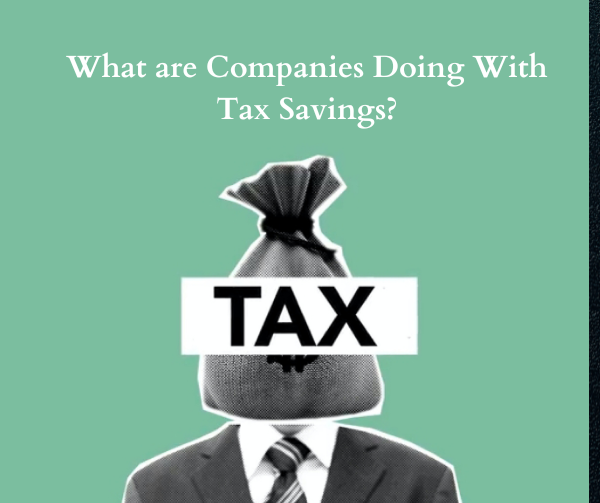With the right tax strategy, your business can avoid paying a sizable sum of taxes to the government. Companies that heavily invest their thought processes to reduce tax liabilities save huge money on taxes.
The big guns like AIG and AT&T have come to the point to enjoy negative taxes and make the most of tax refunds for better business expansions.
However, the bigger question is how these companies allocate the money they save on taxes. In the coming section of the article, we have discussed it in detail about it.

They Provide One-Time Bonuses
Since saving money on taxes gives the company one-time cash, there is a possibility that a firm considers distributing it with a one-time bonus.
Instead of providing staff increases, many firms can opt to give bonuses. Giving bonuses one year and not the next is simpler than giving employees wage hikes that are part of their regular pay.
Bonuses are a terrific way to motivate staff, but before a business decides to give them out, make sure you understand the tax repercussions for both your company and your staff.
Companies like Apple, Bank of America, and KeyCorp are some names that have dispatched one-time bonuses many times to their employees which is something very smart when we talk about saving money on an occasion.
They Increase Minimum Wages
The companies may also consider increasing minimum wages considering their financial sustainability with the money they save on taxes.
Moreover, increasing minimum wages has add-on benefits for the companies and the economy as well. It may boost consumer spending, improve the financial health of companies, and expand the economy.
A little increase may raise output, lower unemployment and turnover, and boost employee satisfaction.
Companies like FedEx, BB%T, etc have empowered their clients with additional incentives and wages once they save a huge amount on their revenues. This enhances employees’ productivity and efficiency.
They Expand on Employee Benefits
Employ benefits increase the efficiency of the company, and if the company receives/saves extra cash while reducing its liabilities, a company can consider expanding its employee benefits.
Moreover, these benefits safeguard employees’ financial health and satisfaction with the company.
For example, Starbucks has started providing new benefits to employees in terms of partner and family sick time to set an example of how to expand employee benefit programs.
They Increase Charitable Contributions
Since donating money to charity directly lowers your tax liabilities, companies may further consider increasing their charitable contribution to take advantage of tax breaks.
Receiving a tax break for charitable contributions is one of the benefits of supporting a charity that your company will see right away.
For example, Boeing and Wells Fargo have granted around $500 million altogether in charitable activities to uplift the state.
They Expand their Businesses
Companies have always been concerned about expanding their business in important areas. However, business owners need sustainable cash flow to further these processes.
A business with a lot of liabilities can NOT consider expanding itself in the market since it can even hurt the present operations as well.
Reducing tax liabilities gives them the opportunity to save cash and then direct this amount on the important operations that are necessary for the expansion.
They Hire More Resources
A company always looks for better resources to join the workforce and reduce the operating hours per employee. However, hiring new resources come at the cost of increasing cash liability.
Business owners who save money while avoiding paying extra cash on taxes get the opportunity to hire new resources in the team and reduce the operational hours per employee.
The companies get the immediate benefit of reducing operation hours per employee. It increases employees’ efficiency and makes work more manageable.
They Invest in R&D
R&D refers to the area of a business’s operations where information is sought in order to create, design, and improve the company’s goods, services, technology, or procedures.
Reducing tax liabilities gives companies more flexibility to invest in R&D. Investment in R&D gives companies the flexibility to test, try and make better decisions.
Investing in research and development combines numerous aspects of a firm’s strategy and plan, such as advertising and cost reduction, in addition to producing new goods and adding features to existing ones.
They Reduce their Prices on Products/Services
Tax liability reduces the operational costs of the business. This may further convince the companies to reduce their prices on the products and attract more buyers.
Immediately the inflation peaks, the companies increase their prices to meet the operational costs.
The similar goes for the scenario in which they reduce operational costs – they may potentially reduce the prices as well while reducing tax liabilities.
They Work on Businesses Sustainability
Tax saving gives companies the opportunity to save extra for the future. The extra cash that a company holds gives them the opportunity to be more flexible and think outside the box as well.
Savings are the funds you set away to pay for unforeseen or anticipated needs in the future. You may be able to save money for long-term plans thanks to tax savings.
Apple, for example, holds billions of cash to deal with unpredictable circumstances. The extra cash gives Apple to take risks and try out different experiments to grow the business.
The more cash the businesses hold, the better opportunity they get to become sustainable.
Conclusion
What companies do with the tax savings varies a lot depending upon the company and its contextual financial health as well. However, there is NO debate on it that saving extra cash while reducing tax liabilities has always been beneficial for companies.
If you are paying extra money on taxes, you may need to evaluate your tax strategy. We strongly recommend talking with a tax consultant who holds years of expertise and can save you money on paying unnecessary taxes.
